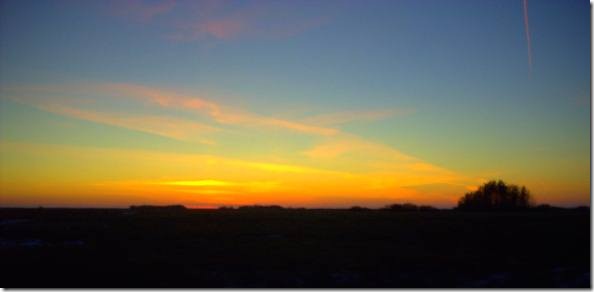Eight hours after dodging death I delivered a qualified account of the incident to my father. He went to see the place—drove there in the old Newport—leaving me worried, but thankful he didn’t force my attendance.
Even so, I watched him: From town, he would drive a mile west, then north along a narrow dirt road. Over a slow rise he would see the car on the east side of the road. He’d pull over and stop at the pasture’s approach, sit for a moment, take in the scene.
Now he’d get out of his car and walk toward the place where the car left the road. Treading through a shallow ditch, stepping over flattened swamp willow and a few broken poplar, he’d reach the pasture. He would walk beside a fresh wound—a stretch of sod ripped open, black and glistening and smelling, to dad, everyday familiar.
And he’d walk the perimeter, take note of the four wheels pointing up like the stumpy legs of roadkill porcupine, one leg bent over—a front wheel torn free from strut and ball joint.
He’d go to his hands and knees now, in the mix of fescue and Timothy and broken glass, focus through the constricted opening of car roof and car body. Inside, large chunks of car-door window still intact, a broken arm rest, a torn-off rear-window hand crank and an empty cigarette package; and no sign of beer bottles.
He’d rise now and walk to the other side, squat again, wonder at the contracted space. Straightening, moving to the crumpled "electric shaver" chrome grill, full of prairie turf, he’d look back, line up the wheels—use them like the sighting on a rifle—and trace the path of travel.
He could see where the ’63 Rambler Ambassador left the road, hit its first poplar, nose down, after coming off the top of the hill airborne and slightly sideways. The tree would have snapped over while the back end of the car rose above the front, on its way to the first of two and one half end-to-end flips. Considering the speed, he would see the intervening willow and scrub poplar a countervailing mercy—well, that and God.
Happy with his calculations as though he was at the kitchen table sketching out modifications to the old store, or the lines of a new fence at the farm, running north toward the dugout, he would almost be transported into the place of his comfort, until remembering I was in this car along with my cousin and two friends, all with fathers that knew each other well in our town of 400.
And he would consider the aftermath with a shudder. The kicking at doors—at which door was his son?—the squeezing of bodies through two slender openings. He would have imagined white faces, certain fear, mouths frozen open, then going slack with some form of regret, surly. And he would have contented himself, as fathers do, with the thought that compressed moments of terror will finally straighten the boys out, settle them down.
And yes, he would have seen drained faces, momentarily panicked, automatic pleas flung out like grapnels, and then the awful quiet, no urge to speak first and discover the worst. Yes, he would have seen all of this; but he would not have seen the quick return to juvenile immortality…as four idiots walked across hay fields, back to town under a rising sun, shoulder to shoulder, cemented together by an exquisite swindle, and my cousin with a Bohemian "stubby" in hand, remarking that he didn’t spill a drop.



“Happy with his calculations as though he was at the kitchen table sketching out modifications to the old store, or the lines of a new fence at the farm…”
Yes, Jake sitting at a table sketching things is a familiar memory for me. At the farm kitchen table, the sketches were for the big Canadian Flag that I painted on the side of the barn in the summer, 1992. It was his “Canada 125” project. Then a year later it was at the kitchen table in town where he was sketching out the garage that he was building on the side of the house (he hired me to help out with that too, for a few days). These are basically my last memories of him, actually.
Thanks for that memory Ian.
A great story about cheating death…wonderfully told from a point of view I can relate to now that I’m on the other side of 40. Thanks for this one, Stephen.
Sometimes I wonder. Was it best when Dad just shook his head at the time. what he was actually thinking. I couldn’t decide if that was a good thing or not.
Thanks. How many did he sit with and sketch
The return to juvenile immortality.. Yup.. As soon as the heats gone eh?! So true..
Ever since I first saw Strange Brew, ive wished you could still buy stubbies..
This is so well told, but I shiver to think of the outcome if the intervening willow and scrub poplar and God hadn’t been there.
Thank you Lisa. Isn’t it true, how years help shift a point of view.
Thanks Joanne. Dad’s calm silence was a killer.
Thanks for this Michael. And yes, with the passing of the “stubby”, you missed a cultural watershed.
Thanks so much Diane.
I remember Dad coming with Mom for a visit – he and I would escape the house and go looking at show homes. He and I planned and dreamed together of all the potential renovations that we could do – although none became reality. They are good memories! Thanks for sharing this word picture of not only your own journey but of Dad’s.
Thanks and you’re welcome Deb.
“four idiots ….”
– the thought crossed my mind before you said it.
– and then, so grateful to have you still around!!
Thank you Sam.